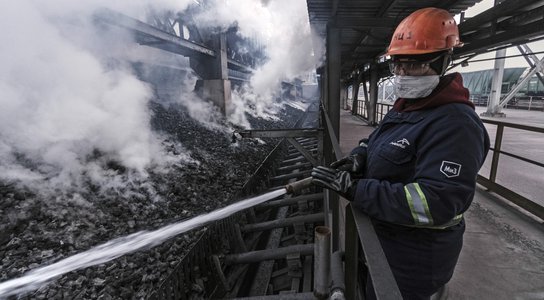With Independence Day around the corner, the US driving season is in full swing. What vacationers filling their tanks don’t know is that, despite everything the US has done to support Ukraine, the gasoline they buy may still have originated in Russia and helped the Kremlin pay for the war. The US government must close this unacceptable loophole and ensure no Russian oil is laundered into the country, while supporting a rapid and just transition to renewable energy.
After Russia invaded Ukraine, the US banned the import of Russian fossil fuels in both an act of Congress and an executive order. This meant it was no longer legal to import oil, gas, or coal from Russia. However, it was—and remains—legal to import gasoline made from Russian crude but refined in other countries.
Last summer, Global Witness reported on this system, which saw Russian crude being refined in countries like the Netherlands and then legally imported to the US. This particular laundering route closed when the EU banned Russian oil imports in December 2022. European refineries can no longer buy Russian crude, but one major route remains wide open.
India is now buying huge quantities of Russian oil, refining it, and exporting products made from it to countries that have sanctioned imports of Russian crude, including the US. To be clear, this is legal: no sanctions prohibit India from buying Russian oil, and once it has been “substantially transformed” (in customs-speak) into other products like gasoline, these can be legally imported to the US.
This oil laundering is not limited to American markets; refined Russian-origin fuel is also flowing into the EU. Its chief diplomat Josef Borrell recently called this practice what it is: a circumvention of sanctions. As the illegal war against Ukraine drags on, with the toll of civilian deaths ticking up, what will it take to close this loophole for good?
The US has long imported about the same proportion of its petroleum products from India—between three to five percent of imports, according to the U.S. Energy Information Administration. What has now changed is the origin of the oil. Before Russia invaded Ukraine, India bought hardly any Russian crude. The invasion, and subsequent sanctions on Russia, upended global oil markets and meant that it was suddenly profitable for Indian refiners to buy the oil that was no longer being sold to Europe. Its imports of Russian crude soared more than tenfold.
It isn’t feasible to test a drop of gasoline at the pump and determine its origin. But Global Witness’s analysis of trade data means we don’t need to. We examined Refinitiv Eikon data for American seaborne imports of oil products including gasoline, jet fuel, and diesel in the first five full months of 2023. In that period, the US imported some 152 million barrels of refined petroleum products by sea. About eight percent of that, or 12.6 million barrels, came from India.
Over 80% of American imports of refined oil products from India came from a single port: Sikka, in Gujarat province, home of the Jamnagar refining complex, the largest in the world. It imports more Russian crude than any other port in the world, according to the Centre for Research on Energy and Clean Air. In those same five months, 35% of the crude arriving at the port was of Russian origin.
This trade virtually ensures that some of the gasoline and diesel that the US buys from India contain Russian molecules. That means many Americans will be embarking on their summer vacation by burning oil originally drilled in Russia. And it means, despite the measures the US and other countries have taken to limit Russian fossil fuel revenues and support Ukraine, that the Kremlin still profits from its oil sales abroad.
On arrival from India, shipments of gasoline and other refined fuels are delivered to ports from New Jersey to Texas to California. From there, they will be sold to unwitting consumers who believe that no Russian oil has been allowed into the country for over a year.
Closing this loophole should be a no-brainer. First, it will indirectly squeeze Kremlin revenues, further hampering its ability to wage war on Ukraine and boosting America’s efforts to support Ukrainian sovereignty. Second, it will end a largely symbolic gap in the sanctions measures that the US has already enacted.
Critically, it will accomplish these goals without affecting the price Americans pay at the pump. The U.S. imported just over 12 million barrels of refined products from India in the first five months of the year - to put that in perspective, the US burns about 20 million barrels of petroleum every day. Patrick de Haan, head of petroleum analysis at GasBuddy, tells Global Witness that while the effects of embargoes are unpredictable, ‘’in the current environment, with economic headwinds, [a ban] wouldn't be much of a catalyst... so while there could be an impact, it's likely to be negligible- a couple cents if not less’’.
How should the US close this laundromat? One way would be to ban the import of refined petroleum from refineries that have bought any Russian crude within a given period - for instance, the previous six months. This would incentivize those companies to drop their Russian suppliers, while signaling to other companies looking to capitalize on cheap Russian oil that their products are not welcome in the US. The EU might follow suit, banning imports from other laundering operations that effectively circumvent the continent’s sanctions on Russia.
Big Oil may try to seize on this as a flimsy excuse to increase production in the US. Make no mistake: such a move would be unjustified and unacceptable. Countries everywhere need to slash their fossil fuel use if we are to keep global heating to livable levels. And the US, which has emitted the most greenhouse gases of any country, bears far and away the most responsibility for speeding a global just transition to local renewable energy. It should also use all the tools at its disposal to end the trade of oil funding the war on Ukraine.
[1] This figure does not include Caspian Pipeline crude (CPC) blend loaded in Russia, most of which is of Kazakh origin.


